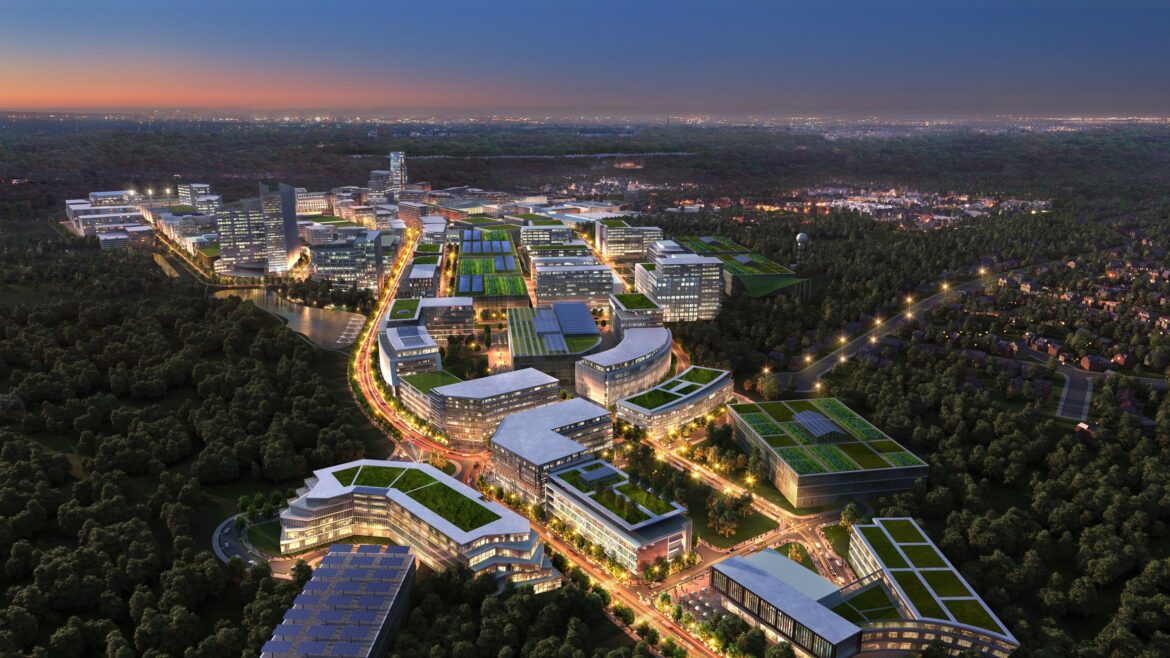This year has marked significant strides in the fight against climate change, with many countries globally setting ambitious targets for carbon reduction and creating eco-friendly spaces for their residents. As urbanization continues to expand rapidly in Pakistan, including in cities like D.I. Khan, we must implement strategies to reduce emissions, conserve energy, and accelerate the transition to renewable energy sources.
With cities and buildings accounting for 65 percent of worldwide energy use, the development of smart cities is viewed as a crucial approach to addressing the climate crisis. A modern city requires sophisticated data, technology, and people to create inclusive and sustainable solutions.
The Role of Smart Buildings in Smart Cities
Smart buildings are increasingly playing a pivotal role in the development of smart cities. They are essential tools for tackling contemporary challenges such as achieving net-zero emissions, ensuring security, and meeting the demand for greater interoperability. With the rise of advanced technology, smart buildings leverage the Internet of Things (IoT) to share data, control processes, and enhance human interactions, promising a future of long-term sustainability.
Today’s smart buildings are fundamental to the evolution of sustainable cities. They contribute to cleaner transportation, optimized resource use such as water and energy, and more intelligent infrastructure that meets essential human needs like security, comfort, and connectivity. By constructing smart buildings, we enhance the livability, workability, and sustainability of our cities.
Energy Consumption Efficiency
Smart buildings are crucial for a future where cities are secure, smart, and sustainable. Building owners can monitor and control their energy consumption, significantly reducing waste. Traditional buildings often use more energy than necessary, leading to inefficiency and environmental harm. Smart buildings, equipped with cutting-edge technology, allow for precise energy tracking and management, minimizing human error and conserving resources.
Immediate Malfunction Detection
One of the key advantages of smart buildings is the immediate detection of malfunctions. Advanced battery management systems and other smart technologies can identify and address issues with minimal human intervention. This rapid response ensures that problems are quickly resolved, maintaining business continuity and reducing downtime.
Data Collection and Analysis
IoT devices in smart buildings make it easy to gather data on various products and services. Sensors can be installed in heating systems, ventilation equipment, and other machinery, providing valuable insights into their usage. This data helps optimize processes, ensuring that resources are used efficiently and effectively. The era of inadequate systems and poor solutions is over, thanks to these innovative technologies.
Promoting Sustainability
Smart buildings contribute significantly to sustainability by focusing on IoT power usage. They help identify and address ongoing issues, reducing the carbon footprint and promoting eco-friendly alternatives. For instance, occupancy sensors can lower carbon dioxide levels by turning off heating, ventilation, and lighting systems when a space is unoccupied. These systems resume normal operations when people return, ensuring a safe and comfortable environment while saving energy and money.
Building a Sustainable Future for D.I. Khan New City
Smart cities are the way of the future, from homes and offices to transportation and utilities. Smart buildings, driven by advances in IoT and AI, will create a new, interconnected, and efficient smart society ecosystem. This development will enable comfortable living while protecting the planet for future generations. Intelligent smart buildings with previously unimaginable features are now a reality and will be critical to the growth of sustainable smart cities, including D.I. Khan New City.
Conclusion
As we move towards a more sustainable future, smart buildings will be at the forefront of this transformation. By embracing smart building technologies and sustainable practices, D.I. Khan New City can lead the way in creating a greener, more efficient, and livable environment for its residents. These innovations not only enhance quality of life but also ensure that we are doing our part to safeguard the planet for future generations.

